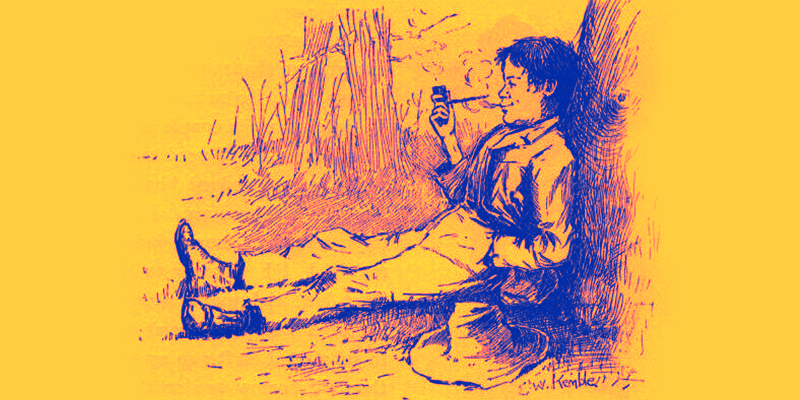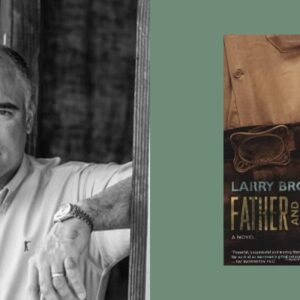I am not known as a young adult author, but I have published two novels about an adolescent character. Travis Hollister is, in the first book, 12 years old, and in the second, nineteen. The novels, Sweet Dream Baby and Night Letter, are really one story, or the stories of two years in Travis’s life, with a gap of six years separating them.
My subject here is voice, which is distinct, I believe from style. Style is a grammarian’s notion. Voice is a writer’s concern. Voice is the sound of a human being speaking, and it’s a performance that can include, I believe, the sound of a character’s thoughts. In my teaching, I have used the term, “voicey,” to describe novels, usually but not always first person narratives, that exhibit extremes of dialect. The two American novels that I considered the most voicey are Huckleberry Finn and The Catcher in the Rye. You can select at random any pages from these two stories, read them aloud, and get instant recognition from most readers.
In the opening pages of Catcher, Holden Caulfield speaks to us from a hospital bed It’s not long before we infer that this hospital is not for the body but for the mind. Holden’s voice, radical, even shocking, for the time of its publication, is elaborately casual, mildly obscene (with lots of “for Christ’s sakes”), and it’s the trying-too-hard voice of the adolescent who tells us everything is fine but communicates by other means that just about everything is wrong. It’s a hard-hearted reader who doesn’t immediately take the young Holden to her bosom. Even the strictest of Presbyterian deacons, once he has recovered from Holden’s casual takings of Christ’s name in vain, pulls the boy into a protective hug.
Huck Finn’s voice is strongly regional, and possibly to our modern tastes, a little too heavily phonetically spelled, but Mark Twain’s authenticity in the creation of a Missouri boy of the mid-nineteenth century is not in question. And Huck is not just a boy, he is an outcast whose father is a drunkard and a petty criminal, an abuser of Huck and others. In Huck’s private thoughts to Twain’s readers, Huck is most shocking when he satirizes religion and other pieties of his time. Huck’s town considers him a bad boy, and Huck does not dispute this. And this is the key to Twain’s magical use of voice. By making Huck a self-described ne’er-do-well and miscreant, and by demonstrating through Huck’s behavior that the boy is actually the opposite of these things, is in fact, quite possibly the best person in the world of the novel, Twain satirizes a corrupt society and condemns the “peculiar institution” of slavery. Twain speaks to us through Huck about things Huck himself can only dimly perceive.
Imagine the novel if the town says Huck is bad, and Huck says Huck is bad, and Huck is, in fact, bad. By accepting the town’s assessment of him, a judgment that comes from the town’s self-righteousness and hypocrisy, Huck demonstrates how completely he has been psychologically damaged. He does not speak out against his exile, but his actions make us reject it, and reject the values of those who have cast him out. Huck’s voice is the straightforward, honest sound of self-condemnation, and of acceptance of the morality that surrounds him. Underneath that sound lives the sound of Huck’s indomitable spirit, the boy within the boy whose core nature has not been destroyed or even damaged. The boy whose moral compass sends him off on a raft with the escaped slave, Jim.
Huck Finn’s second nature is the boy who accepts his own criminality and helps another criminal, the escapee Jim, to “light out for the territory.”olden’s H In the territory, possibly, an escaped slave and a runaway bad boy can live a life that is, if not conventionally good, then at least as good as what surrounds them. In the territory, we readers infer, there is refuge for the many who have been cast out or have run away.
Both Holden and Huck exhibit two natures, the public nature and the private one. It’s a measure of the cruelty of the world, that the private nature must remain hidden. It’s the work of the good reader to discover this nature which is available only through inference, or only after the public self has broken down. Holden’s public self has failed so badly that he has been hospitalized. Holden’s private nature is that of the scared child who despairs not just for himself, but for the world, a world that damages children. That private boy’s dream, both literal and metaphorical, is to be The Catcher in the Rye, the imaginary, mythical figure who keeps children from harm.
The dual natures of Holden and Huck are relatively easy to describe, but not so easy to portray in pages of fiction. They must be shown, not told. Holden shows his buried nature by talking too loudly and too often about how much he doesn’t care and about how everything with him is fine. Huck shows his by his naive acceptance of what the reader learns through inference to reject. Inference is the key. It’s showing, not telling.
In my two novels, Sweet Dream Baby and Night letter, the story of Travis Hollister, I struggled to discover how to embody Travis’s two natures in the tone and cadences of his voice. Travis begins the first novel as a twelve-year-old boy whose mother, a Japanese war bride, has just been sent to an asylum for the insane. Travis’s father, a Marine who fought in some of the worst battles of the Pacific war, is a loving man who can’t provide Travis the kind of care he needs.
He sends Travis to live with his grandparents in rural north Florida. The trip from Omaha, Nebraska, to the deep South is a shock for Travis. In the small town where his grandfather is the sheriff, Travis is both the fish out of water and the stranger who comes to town. Soon Travis falls in love with his aunt Delia, who is sixteen, beautiful, popular, and troubled for reasons Travis must discover. Travis is a stranger in a strange land, a boy deprived of his mother’s love, and of everything and every person familiar to him. My discovery was that what Travis wants and needs most is to possess. As I wrote the novel, I saw that the word “my” kept appearing in Travis’s first person speech and thoughts, and eventually his most often repeated phrase, his mantra, almost a prayer, was “my aunt Delia.” Travis can’t name his loss or what he wishes to gain, but the reader infers that possession is Travis’s obsession. Eventually, as the novel’s plot plays out, Travis makes the journey from simply wanting to belong, to be accepted by his grandparents, his aunt Delia, and her teenaged friends, and in one way or another by the town, to wanting, needing to possess Delia in every way that a boy becoming a man can possess her.
The world of a child’s thoughts is, syntactically a world of simple and compound, not complex sentences. It is not a world of subordination. The world comes at children as discreet units of action or sensory information. Hemingway was perhaps the first to discover this, and he applied this insight to war-damaged men as well as children.
“In the fall, the war was always there, but we did not go to it anymore. It was cold in the fall in Milan, and the dark came very early. And then the electric lights came on, and it was pleasant along the streets looking in the windows. There was much game hanging outside the shops, and the snow powdered in the fur of the foxes, and the wind blew their tails. The deer hung stiff and heavy and empty, and small birds blew in the wind and the wind turned their feathers. It was a cold fall and the wind came down from the mountains.” — In Another Country.
Subordination, a feature of complex sentences, is not the sound of a damaged child’s voice. For me, it was not the sound of Travis Hollister.
As a nineteen-year-old in the second novel, Travis emerges into manhood. He leaves his childhood and a reform school behind him. As an incarcerated youth, Travis owned nothing. His prizes in prison have been secrets, a contraband radio and the journal in which he has recorded his obsession with Delia. When he is given his freedom at last, his quest is to find Delia . . . and then what? He isn’t sure, but he is sure he will know what to do when the time comes. The word “my,” the idea of possession, is still important to the nineteen-year-old Travis of Night Letter, and when he find Delia, he regresses, becoming for a while the boy to whom she was “my aunt Delia.” But of course Delia has much to say about who owns what and whom. In one way, Travis’s growth through Night Letter is toward releasing Delia to her own identity and fate, the world of her own choosing, rather than of his fantasy and of their past. And as the story develops, Travis learns also that caring for another person can be as powerful and fulfilling for a man as was possessing for a child.
***


















